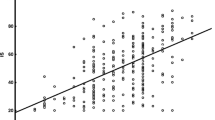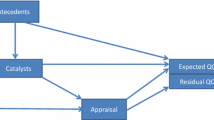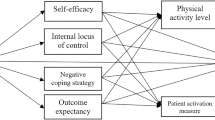Abstract
Purpose
Health-related quality of life (HRQoL) is considered an important measure of treatment and rehabilitation outcomes in multiple sclerosis (MS) patients. In this study, we used multivariate regression analysis to examine the role of cognitive appraisals, adjusted for clinical, socioeconomic and demographic variables, as correlates of HRQoL in MS.
Methods
The cross-sectional study included 257 MS patients, who completed Multiple Sclerosis Impact Scale, Generalized Self-Efficacy Scale, Rosenberg Self-Esteem Scale, Brief Illness Perception Questionnaire, Treatment Beliefs Scale, Actually Received Support Scale (a part of Berlin Social Support Scale) and Socioeconomic Resources Scale. Demographic and clinical characteristics of the participants were collected with a self-report survey. Correlation and regression analyses were conducted to determine associations between the variables.
Results
Five variables, illness identity (β = 0.29, p ≤ 0.001), self-esteem (β = −0.22, p ≤ 0.001), general self-efficacy (β = −0.21, p ≤ 0.001), disability subgroup “EDSS” (β = 0.14, p = 0.006) and age (β = 0.12, p = 0.012), were significant correlates of HRQoL in MS. These variables explained 46 % of variance in the dependent variable. Moreover, we identified correlates of physical and psychological dimensions of HRQoL.
Conclusions
Cognitive appraisals, such as general self-efficacy, self-esteem and illness perception, are more salient correlates of HRQoL than social support, socioeconomic resources and clinical characteristics, such as type and duration of MS. Therefore, interventions aimed at cognitive appraisals may also improve HRQoL of MS patients.
Similar content being viewed by others
References
Johnson, K. L., Amtmann, D., Yorkston, K., Klasner, E. R., & Kuehn, C. M. (2004). Medical, psychological, social, and programmatic barriers to employment for people with multiple sclerosis. Journal of Rehabilitation-Washington, 70, 38–49.
Patrick, D. L., & Bergner, M. (1990). Measurement of health status in the 1990s. Annual Review of Public Health, 11, 165–183.
McCabe, M. P., & McKern, S. (2002). Quality of life and multiple sclerosis: Comparison between people with multiple sclerosis and people from the general population. Journal of Clinical Psychology in Medical Settings, 9, 287–295.
Benito-León, J., Manuel Morales, J., Rivera-Navarro, J., & Mitchell, A. J. (2003). A review about the impact of multiple sclerosis on health-related quality of life. Disability and Rehabilitation, 25(23), 1291–1303.
Rudick, R. A., Miller, D., Clough, J. D., Gragg, L. A., & Farmer, R. G. (1992). Quality of life in multiple sclerosis. Comparison with inflammatory bowel disease and rheumatoid arthritis. Archives of Neurology, 49, 1237–1242.
Hermann, B. P., Vickrey, B., Hays, R. D., Cramer, J., Devinsky, O., Meador, K., et al. (1996). A comparison of health-related quality of life in patients with epilepsy, diabetes and multiple sclerosis. Epilepsy Research, 25(2), 113–118.
Naess, H., Beiske, A. G., & Myhr, K. M. (2008). Quality of life among young patients with ischaemic stroke compared with patients with multiple sclerosis. Acta Neurologica Scandinavica, 117, 181–185.
Fernández-Jiménez, E., Pérez-San-Gregorio, M. A., Martín-Rodríguez, A., Domínguez-Cabello, E., Navarro-Mascarell, G., & Bernardos-Rodríguez, A. (2012). Comparison of quality of life between two clinical conditions with immunosuppressive therapy: Liver transplantation and multiple sclerosis. In Transplantation proceedings (Vol. 44, No. 9, pp. 2609–2611). Amsterdam: Elsevier.
Riazi, A., Hobart, J. C., Lamping, D. L., Fitzpatrick, R., Freeman, J. A., Jenkinson, C. A. A., et al. (2003). Using the SF-36 measure to compare the health impact of multiple sclerosis and Parkinson’s disease with normal population health profiles. Journal of Neurology, Neurosurgery and Psychiatry, 74(6), 710–714.
Rudick, R. A., & Miller, D. M. (2008). Health-related quality of life in multiple sclerosis. CNS Drugs, 22(10), 827–839.
Fruehwald, S., Loeffler-Stastka, H., Eher, R., Saletu, B., & Baumhackl, U. (2001). Depression and quality of life in multiple sclerosis. Acta Neurologica Scandinavica, 104, 257–261.
Mikula, P., Nagyova, I., Krokavcova, M., Vitkova, M., Rosenberger, J., Szilasiova, J., et al. (2015). Social participation and health-related quality of life in people with multiple sclerosis. Disability and Health Journal, 8(1), 29–34.
Benito-Leon, J., Morales, J. M., & Rivera-Navarro, J. (2002). Health-related quality of life and its relationship to cognitive and emotional functioning in multiple sclerosis patients. European Journal of Neurology, 9(5), 497–502.
Yamout, B., Issa, Z., Herlopian, A., El Bejjani, M., Khalifa, A., Ghadieh, A. S., & Habib, R. H. (2013). Predictors of quality of life among multiple sclerosis patients: A comprehensive analysis. European Journal of Neurology, 20(5), 756–764.
Jaracz, K., Pawlak, M., Górna, K., Kołcz, B., Wołoszyn, D., & Kozubski, W. (2010). Quality of life and social support in patients with multiple sclerosis. Neurologia i Neurochirurgia Polska, 44(4), 358–365.
Spain, L. A., Tubridy, N., Kilpatrick, T. J., Adams, S. J., & Holmes, A. C. N. (2007). Illness perception and health-related quality of life in multiple sclerosis. Acta Neurologica Scandinavica, 116(5), 293–299.
Motl, R. W., McAuley, E., Snook, E. M., & Gliottoni, R. C. (2009). Physical activity and quality of life in multiple sclerosis: Intermediary roles of disability, fatigue, mood, pain, self-efficacy and social support. Psychology, Health and Medicine, 14(1), 111–124.
Fernandez, O., Baumstarck-Barrau, K., Simeoni, M. C., & Auquier, P. (2011). Patient characteristics and determinants of quality of life in an international population with multiple sclerosis: Assessment using the MusiQoL and SF-36 questionnaires. Multiple Sclerosis, 17(10), 1238–1249.
Mitchell, A. J., Benito-León, J., González, J. M. M., & Rivera-Navarro, J. (2005). Quality of life and its assessment in multiple sclerosis: Integrating physical and psychological components of wellbeing. Lancet Neurology, 4(9), 556–566.
Pfaenberger, N., Pfeiffer, K. P., Deibl, M., Hofer, S., Gunther, V., & Ulmer, H. (2006). Association of factors influencing health-related quality of life in MS. Acta Neurologica Scandinavica, 114, 102–108.
Lobentanz, I. S., Asenbaum, S., Vass, K., Sauter, C., Klösch, G., Kollegger, H., et al. (2004). Factors influencing quality of life in multiple sclerosis patients: Disability, depressive mood, fatigue and sleep quality. Acta Neurologica Scandinavica, 110, 6–13.
Amato, M. P., Ponziani, G., Rossi, F., Liedl, C. L., Stefanile, C., & Rossi, L. (2001). Quality of life in multiple sclerosis: The impact of depression, fatigue and disability. Multiple Sclerosis, 7, 340–344.
Janardhan, V., & Bakshi, R. (2002). Quality of life in patients with multiple sclerosis: The impact of fatique and depression. Journal of the Neurological Sciences, 205, 51–58.
Benedict, R. H., Wahlig, E., Bakshi, R., Fishman, I., Munschauer, F., Zivadinov, R., & Weinstock-Guttman, B. (2005). Predicting quality of life in multiple sclerosis: Accounting for physical disability, fatigue, cognition, mood disorder, personality, and behavior change. Journal of the Neurological Sciences, 231(1), 29–34.
Papuc, E., & Stelmasiak, Z. (2012). Factors predicting quality of life in a group of Polish subjects with multiple sclerosis: Accounting for functional state, socio-demographic and clinical factors. Clinical Neurology and Neurosurgery, 114, 341–346.
Hart, S., Fonareva, I., Merluzzi, N., & Mohr, D. C. (2005). Treatment for depression and its relationship to improvement in quality of life and psychological well-being in multiple sclerosis patients. Quality of Life Research, 14, 695–703.
Van Schependom, J., D’hooghe, M. B., De Schepper, M., Cleynhens, K., D’hooge, M., Haelewyck, M. C., et al. (2014). Relative contribution of cognitive and physical disability components to quality of life in MS. Journal of the Neurological Sciences, 336(1), 116–121.
McGinn, L. K. (2000). Cognitive behavioral therapy of depression: Theory, treatment, and empirical status. American Journal of Psychotherapy, 54, 254–260.
Folkman, S., Lazarus, R. S., Dunkel-Schetter, C., DeLongis, A., & Gruen, R. J. (1986). Dynamics of a stressful encounter: Cognitive appraisal, coping, and encounter outcomes. Journal of Personality and Social Psychology, 50(5), 992.
Kennedy, P., Evans, M., & Sandhu, N. (2009). Psychological adjustment to spinal cord injury: The contribution of coping, hope and cognitive appraisals. Psychology Health and Medicine, 14(1), 17–33.
Hobart, J., Lamping, D., Fitzpatrick, R., Riazi, A., & Thompson, A. (2001). The Multiple Sclerosis Impact Scale (MSIS-29): A new patient-based outcome measure. Brain, 124, 962–973.
Gray, O. M., McDonnell, G. V., & Hawkins, S. A. (2009). Tried and tested: The psychometric properties of the Multiple Sclerosis Impact Scale (MSIS-29) in a population-based study. Multiple Sclerosis, 15(1), 75–80.
Broadbent, E., Petrie, K. J., Main, J., & Weinman, J. (2006). The Brief Illness Perception Questionnaire. Journal of Psychosomatic Research, 60, 631–637.
Leventhal, H., Meyer, D., & Nerenz, D. R. (1980). The common sense representation of illness danger. In S. Rachman (Ed.), Contributions to Medical Psychology (pp. 17–30). New York, NY: Pargamon.
Schwarzer, R., & Jerusalem, M. (1995). Generalized self-efficacy scale. In J. Weinman, S. Wright, & M. Johnston (Eds.), Measures in health psychology: A user’s portfolio. Causal and control beliefs (pp. 35–37). Windsor, UK: Nfer-Nelson.
Rosenberg, M. (1989). Society and the adolescent self-image. Middletown, CT: Wesleyan University Press.
Schulz, U., & Schwarzer, R. (2003). Soziale Unterstu¨tzung bei der Krankheitsbewa¨ltigung. Die Berliner Social Support Skalen (BSSS) [Social support in coping with illness: The Berlin Social Support Scales (BSSS)]. Diagnostica, 49, 73–82.
Luszczynska, A., Mohamed, N. E., & Schwarzer, R. (2005). Self-efficacy and social support predict benefit finding 12 months after cancer surgery: The mediating role of coping strategies. Psychology, Health and Medicine, 10, 365–375.
Kurtzke, J. F. (1983). Rating neurologic impairment in multiple sclerosis: An Expanded Disability Status Scale (EDSS). Neurology, 33, 1444–1452.
Riazi, A., Thompson, A. J., & Hobart, J. C. (2004). Self-efficacy predicts self-reported health status in multiple sclerosis. Multiple Sclerosis, 10(1), 61–66.
Dlugonski, D., & Motl, R. W. (2012). Possible antecedents and consequences of self-esteem in persons with multiple sclerosis: Preliminary evidence from a cross-sectional analysis. Rehabilitation Psychology, 57(1), 35.
Barnwell, A. M., & Kavanagh, D. J. (1997). Prediction of psychological adjustment to multiple sclerosis. Social Science and Medicine, 45(3), 411–418.
Bonsaksen, T., Haukeland-Parker, S., Lerdal, A., & Fagermoen, M. S. (2014). A 1-year follow-up study exploring the associations between perception of illness and health-related quality of life in persons with chronic obstructive pulmonary disease. International Journal of Chronic Obstructive Pulmonary Disease, 9(1), 41–50.
Janssen, V., De Gucht, V., van Exel, H., & Maes, S. (2013). Changes in illness perceptions and quality of life during participation in cardiac rehabilitation. International Journal of Behavioral Medicine, 20(4), 582–589.
Graham, C. D., Weinman, J., Sadjadi, R., Cahlder, T., Petty, R., Hanna, M. G., et al. (2014). A multicentre postal survey investigating the contribution of illness perceptions, coping and optimism to quality of life and mood in adults with muscle disease. Clinical Rehabilitation, 28(5), 508–519.
Benyamini, Y., Goner-Shilo, D., & Lazarov, A. (2012). Illness perception and quality of life in patients with contact dermatitis. Contact Dermatitis, 67(4), 193–199.
Dennison, L., Moss-Morris, R., Silber, E., Galea, I., & Chalder, T. (2010). Cognitive and behavioural correlates of different domains of psychological adjustment in early-stage multiple sclerosis. Journal of Psychosomatic Research, 69(4), 353–361.
Hyphantis, T., Kotsis, K., Tsifetaki, N., Creed, F., Drosos, A. A., Carvalho, A. F., & Voulgari, P. V. (2013). Depressive and anxiety symptoms and illness perceptions associated with physical health-related quality of life in rheumatologic disorders. Journal of Psychosomatic Research, 74(6), 548.
Timmers, L., Thong, M., Dekker, F. W., Boeschoten, E. W., Heijmans, M., Rijken, M., et al. (2008). Illness perceptions in dialysis patients and their association with quality of life. Psychology and Health, 23(6), 679–690.
Chen, K., Fan, Y., Hu, R., Yang, T., & Li, K. (2013). Impact of depression, fatigue and disability on quality of life in Chinese patients with multiple sclerosis. Stress and Health, 29(2), 108–112.
Cioncoloni, D., Innocenti, I., Bartalini, S., Santarnecchi, E., Rossi, S., Rossi, A., & Ulivelli, M. (2014). Individual factors enhance poor health-related quality of life outcome in multiple sclerosis patients. Significance of predictive determinants. Journal of the Neurological Sciences, 345(1), 213–219.
Schwartz, C., & Frohner, R. (2005). Contribution of demographic, medical, and social support variables in predicting the mental health dimension of quality of life among people with multiple sclerosis. Health and Social Work, 30(3), 203–212.
Ford, H. L., Gerry, E., Johnson, M. H., & Tennant, A. (2001). Health status and quality of life of people with multiple sclerosis. Disability and Rehabilitation, 15, 516–521.
Merkelbach, S., Sittinger, H., & Koenig, J. (2002). Is there a differential impact of fatigue and physical disability on quality of life in multiple sclerosis? The Journal of Nervous and Mental Disease, 190, 388–393.
Krokavcova, M., van Dijk, J. P., Nagyova, I., Rosenberger, J., Gavelova, M., Middel, B., et al. (2008). Social support as a predictor of perceived health status in patients with multiple sclerosis. Patient Education and Counseling, 73(1), 159–165.
Tepavcevic, D. K., Pekmezovic, T., Stojsavljevic, N., Kostic, J., Basuroski, I. D., Mesaros, S., & Drulovic, J. (2014). Change in quality of life and predictors of change among patients with multiple sclerosis: A prospective cohort study. Quality of Life Research, 23(3), 1027–1037.
Costa, D. C., Sá, M. J., & Calheiros, J. M. (2012). The effect of social support on the quality of life of patients with multiple sclerosis. Arquivos de Neuro-Psiquiatria, 70(2), 108–113.
Riazi, A., Hobart, J. C., Fitzpatrick, R., Freeman, J. A., & Thompson, A. J. (2003). Socio-demographic variables are limited predictors of health status in multiple sclerosis. Journal of Neurology, 250(9), 1088–1093.
De Judicibus, M. A., & McCabe, M. P. (2007). The impact of the financial costs of multiple sclerosis on quality of life. International Journal of Behavioral Medicine, 14(1), 3–11.
Honarmand, K., Akbar, N., Kou, N., & Feinstein, A. (2011). Predicting employment status in multiple sclerosis patients: The utility of the MS functional composite. Journal of Neurology, 258, 244–249.
McCabe, M. P., Stokes, M., & McDonald, E. (2009). Changes in quality of life and coping among people with multiple sclerosis over a 2 year period. Psychology Health and Medicine, 14(1), 86–96.
Wu, M. H., Lee, S., Su, H. Y., & Pai, H. C. (2015). The effect of cognitive appraisal in middle-aged women stroke survivors and the psychological health of their caregivers: A follow-up study. Journal of Clinical Nursing. doi:10.1111/jocn.12926.
Acknowledgments
We would like to gratefully acknowledge all the individuals with multiple sclerosis who completed a questionnaire, Dr. Mariusz Kowalewski, the manager of Multiple Sclerosis Rehabilitation Centre in Borne Sulinowo and Mrs. Danuta Lawniczak from the Polish Society of Multiple Sclerosis for their help in enrollment of the study participants and Mrs. Magdalena Lewandowska for her assistance in statistical analysis.
Author information
Authors and Affiliations
Corresponding author
Ethics declarations
Conflict of interest
The authors declare that they have no conflict of interest.
Ethical approval
All procedures performed in studies involving human participants were in accordance with the ethical standards of the institutional and/or national research committee and with the 1964 Helsinki Declaration and its later amendments or comparable ethical standards.
Rights and permissions
About this article
Cite this article
Wilski, M., Tasiemski, T. Health-related quality of life in multiple sclerosis: role of cognitive appraisals of self, illness and treatment. Qual Life Res 25, 1761–1770 (2016). https://doi.org/10.1007/s11136-015-1204-3
Accepted:
Published:
Issue Date:
DOI: https://doi.org/10.1007/s11136-015-1204-3




